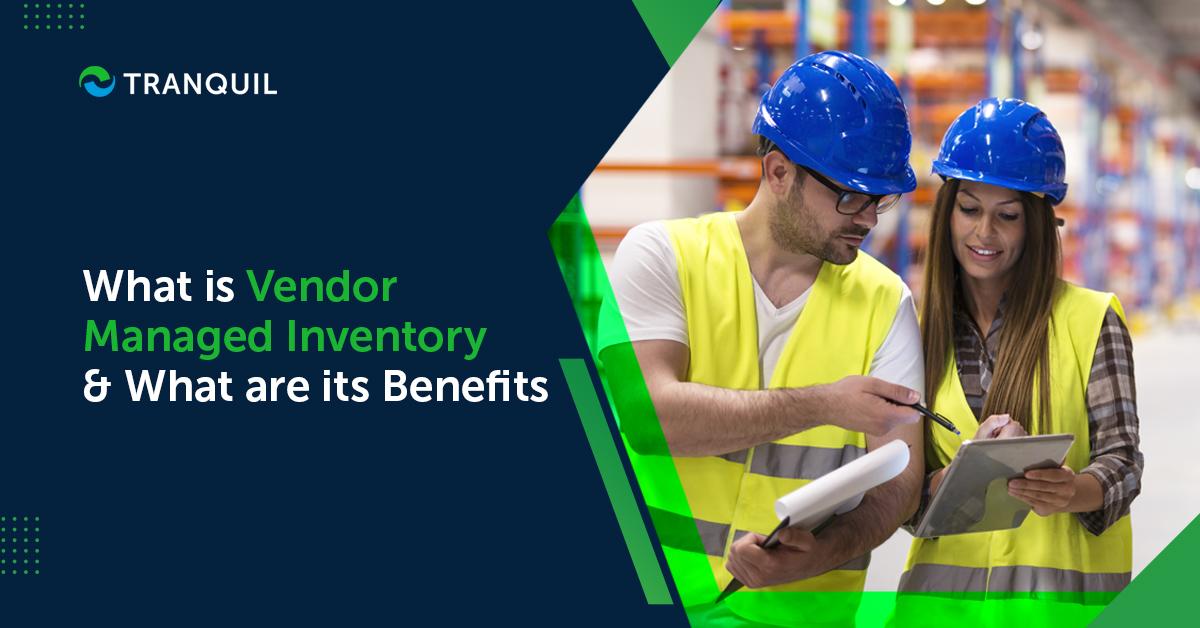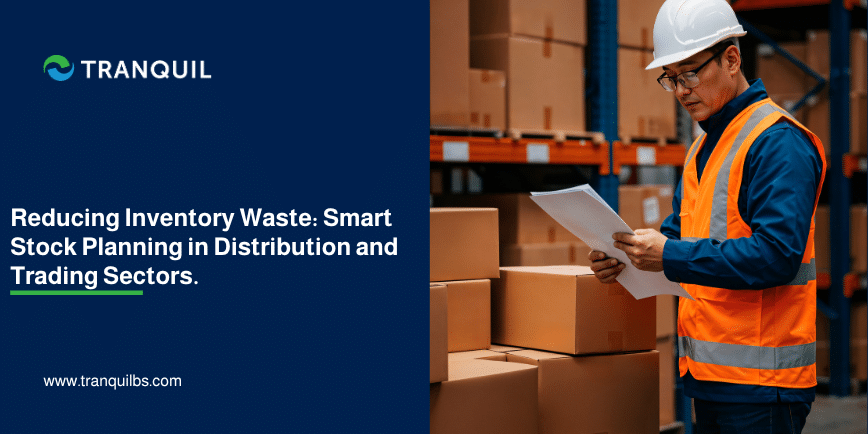
What is Vendor Managed Inventory and What are its Benefits?
Inventory management is a critical function of any business and has to be executed efficiently for business success and growth.
The larger the business, the more complex it becomes, and the more attention it demands.
Uncertain demand predictions and rapidly shifting costs add to the problems.
A possible solution to this situation could be vendor managed inventory or VMI.
ALSO READ: Important ERP Modules and Functions
What is VMI?
Under the vendor managed inventory approach, a company outsources the maintenance of their stock levels to their vendor.
This means no more guesswork and forecasting required, and time in hand to focus on other business functions.
VMI can help businesses streamline every phase in the supply chain and boost financial performance.
It forges close ties between businesses and vendors, as putting a third party in charge of your inventory includes having great trust.
ALSO READ: Influence and Importance of ERP System in Different Industries
Benefits of VMI
Everyone involved in the supply chain can enjoy certain benefits under this system.
Let’s see in detail:
VMI Benefits to the Customer

The last element of any supply chain is the customer – who can be a business too – who is the product user.
They don’t control the supply chain but are critical because the chain can fail if the customer doesn’t buy the product.
Let’s see the benefits customers get:
1. Enhanced Customer Experience
With the right inventory level at all times, you can fulfil customer orders every time, which makes their purchasing experience much better.
Positive experiences turn customers into your brand advocates and can get you more business.
ALSO READ: ERP Software to Enhance your Purchase Management
2. Transparency
Today’s discerning customer is interested in knowing where their product comes from and how it was made – which is why the fair market, sustainable, and organic products are in demand.
This shift is pretty recent, and retailers may be unable to answer these questions.
With a vendor managed inventory, they have more transparency regarding the origin of their products
VMI Benefits to the Retailer/Distributor

1. Never Face Stockout
Retailers have to always balance their act – excess inventory means more holding costs, too less and they lose sales.
The vendor often has better visibility into the retailer’s stock and can make small deliveries so that you don’t get stocked out.
This means you rarely miss sales.
ALSO READ: Guide on ERP in Production Planning
2. Streamlined Processes and Reduced Costs
Excessive inventory can tie up funds and space in your warehouse, while less stock means the risk of losing sales.
In a vendor managed inventory system, purchase orders can be auto-generated, avoiding manual errors in data entry.
Also, the supplier has substantial efficiency as more precise and updated data is used for processing orders, which helps retailers to:
- Decrease the general number of orders
- Reduce the number of expensive urgent orders
- Eliminating returns due to replacing products
3. Higher Inventory Turnover
As the vendor is ready to push small deliveries, the retailer need not stock a lot of products to meet consumer demand.
Reduced inventory cost means a better inventory turnover ratio.
This also leaves more money in the hands of the business, and this can be invested in activities like research, marketing, purchasing new equipment, hiring more employees, etc.
With the vendor delivering inventory based on actual demand in real-time, they share the inventory risk with the buyer, who has almost the exact stock levels that they can sell.
4. Improved Sales Figures
The VMI process can give suppliers a greater understanding of actual consumer demand.
This means they are better placed to respond to the present conditions and future plans of consumers and can improve the service it provides to customers – resulting in increased sales.
ALSO READ: How Does Landed Cost Affect the Cost of Inventory?
VMI Benefits to the Manufacturer

1. Better Forecasting Ability
The manufacturer may find it tough to predict how much to produce; of course, it depends on the likely quantity their customers will buy.
But this information can be hard to come by when there are retailers and distributors between producer and buyer.
However, in a VMI solution, the whole supply chain is connected, and the producer has direct visibility into the sales statistics of the retailer.
This helps them make accurate predictions, and are prepared to meet retailers’ demands when they need it.
ALSO READ: What is Negative Inventory?
2. Precise Ordering and Fulfilment
Order fulfilment is critical for manufacturers.
They have to manufacture the right product, send the right product, and make the right quantity – else they could lose a lot of money.
As VMI digitizes and streamlines the processes, it can help eliminate the errors of ordering and fulfilment that occur in conventional supply chains.
Common VMI Benefits
There are certain benefits which are commonly shared by all the elements in the supply chain.
1. More Stability
A problem with a single link in the supply chain can affect several others.
If a company has to produce goods for a single customer to fulfil their emergency demand, their other customers will face delays.
In a VMI supply chain, everything is linked and the risk of huge disruptions is greatly reduced.
ALSO READ: What are Backorders and How to Manage or Avoid Them?
2. Better Alignment of Inventory and Customer Demand
This is the single biggest of vendor managed inventory benefits.
With the supplier in charge of product replenishment, they can adjust inventories according to consumer demand.
The entire supply chain responsiveness to factors like innovations, special promotions, and seasonal changes can be significantly improved.
Suppliers can coordinate lead times of producers as the demand variability effects can be handled better.
On the other hand, suppliers only need to stock minimal inventory – no stockouts or high costs.
ALSO READ: Ways to Improve the Procurement Process?
Disadvantages of Vendor Managed Inventory
- You have to let go of your control over your inventory to an outsider which may be uncomfortable, and create security issues
- Partnering with a vendor for VMI could create problems in your supply chain if you are unhappy with their service
- This is not an ideal option for businesses who have the expertise in handling demand fluctuations for your products. While the supplier will factor in your insights, it may not always reflect market shifts
These are the most commonly experienced vendor managed inventory advantages and disadvantages.
You need to weigh these, and also look at how it differs from the conventional method.
Is Vendor Managed Inventory Right for You?

The main aim of the VMI approach is to ensure that the distributor or retailer only stocks what they can sell.
Remember, for this to work, the vendor and retailer must have excellent communication between them.
Of course, the availability of VMI software today makes it easier than earlier.
While it is an effective strategy for a number of businesses, it is not necessarily the best thing for everyone.
ALSO READ: Tips For Efficient Stocktaking
Take a look at the following factors and then decide:
Product Type
Are your products perishable or long-lasting?
Do you have a wide product mix or a handful of major sellers only?
If your inventory process is complicated, you might be better off with some help in that regard.
Demand
Think if your customers keep changing preferences or if you face seasonal demand.
Understanding market fluctuations is not as simple as it seems.
In some instances, the business owners may be the best judges; in others, the vendors may be seasoned veterans who are able to figure out more accurately what the business needs.
ALSO READ: Detailed Guide to Batch Tracking
Your Inventory Management History
If you have managed your inventory yourself till now, how often have you had to face stockouts and lost sales?
How much of an impact did it make in monetary terms?
How much dead stock have you ended up with, and how much slow-moving inventory?
How much did it cost to store, insure, handle and secure those goods?
If such incidents have happened once too often, it means your track record isn’t too great.
You could try outsourcing it for better results.
Vendor Reputation
For your VMI solution to be successful, the vendor also has to be good. It is imperative to know your vendor’s reputation and background.
Check if others in the industry have used their services, and get their feedback.
Have a detailed discussion with the vendor to evaluate if he is a good fit for your business.
Check if there is a single point of contact who you can approach.
Vendor managed inventory is an economical method of inventory handling, and you can certainly gain a lot if you find that it will be a viable solution for you after weighing all the factors mentioned above.
ALSO READ: HCM vs HRM
Implementing a Vendor-Managed Inventory Strategy

Supposing you have decided to go ahead with this strategy, here are the steps you need to take:
1. Calculate the ROI
See if you can define the business value of the VMI.
Like, if you decrease your inventory by x percentage, what would be the effect on your business?
If you never got stocked out, what would be the increase in sales?
Answering such questions will help you calculate the returns you can get on your VMI investment.
ALSO READ: Detailed Guide on ROI on ERP Implementation
2. Communicate with Your Vendors
You need to communicate and collaborate with vendors; improve your relationship with them so that you are clear about each other’s requirements.
3. Get the Right Technology
Last, you need the ideal technology.
Though conventional VMI solutions based on EDI tech have been around for a while, modern solutions like are more user-friendly, feature-packed, and robust.
Getting the Most from Vendor-Managed Inventory

Implementing a VMI process can be quite a disruptive change for everyone involved.
There are several tactics you can employ to make sure you get the maximum benefits from this system.
ALSO READ: What is Business Process Improvement (BPI)?
Here are some tips to remember:
Develop a Good Data-sharing Process
It’s essential for customers and suppliers to be on the same page for the VMI to be successful – and tight data integration is critical here.
Typically, vendors deploy their own inventory management solution at their supplier’s location so that they can directly monitor the inventory status, and analyse the data collected to enhance responsiveness while helping customers to identify areas of cost-cutting.
The customer can share historical sales data and demand forecasts to simplify the process and increase efficiency.
Both parties can deploy compatible systems and have stringent protocols for protecting customer data.
Establish Clear Goals
Both parties must define their goals clearly, and each has to understand the other side.
Goals must be realistic, and the parties need to understand that a few hiccups in the initial stages are natural.
ALSO READ: Product Bundling in Inventory Management
Get your Team on Board
With VMI, your employees are freed from managing inventory, but they should not be completely kept away from the process.
It’s a good practice to have a trained team, dedicated to support the process.
They can monitor performance, identify areas of improvement, and check for any missing links that need to be fixed.
ALSO READ: What is Batch Picking?
At Tranquil, our ERP solution comes with a robust inventory management module which helps you manage inventory efficiently and cost-effectively. It is flexible and scalable, and secure too. Book a demo to see how Tranquil can help your business. Our team will explain everything, and answer any query you have.



